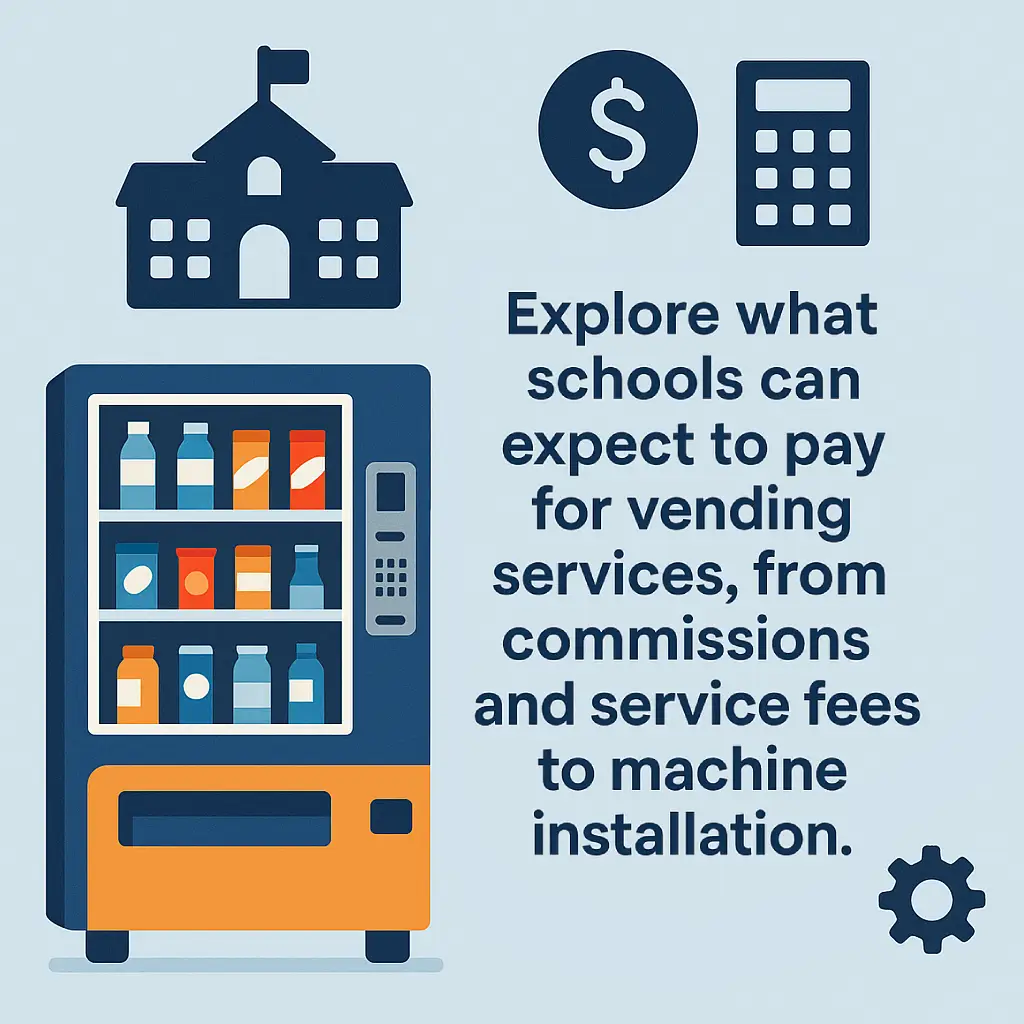Cost of Vending Services for Schools
Explore what schools can expect to pay for vending services, from commissions and service fees to machine installation.
Back to Vending for Schools ResourcesExplore what schools can expect to pay for vending services, from commissions and service fees to machine installation.
Back to Vending for Schools ResourcesMost schools don’t pay for vending machine installation or servicing. Qualified locations frequently receive machines, setup, product stocking, and repairs for free, with vendors earning revenue via product sales. Commissions may also be paid back to the school depending on the agreement.
![]() Many school vending programs cost nothing to install or maintain
Many school vending programs cost nothing to install or maintain
![]() Commissions vary depending on vendor, sales, and machine type
Commissions vary depending on vendor, sales, and machine type
![]() Top vendors offer free service and product restocking
Top vendors offer free service and product restocking

For schools exploring vending services, understanding potential costs is a common concern. Fortunately, in many cases, qualified schools can get vending machines installed and stocked at no cost. Most vending providers offer free installation, service, and equipment placement in exchange for the ability to sell products on-site. This cost-effective model makes vending a low-risk solution for schools looking to offer snacks, drinks, or healthier options to students and staff.
The cost structure of school vending typically revolves around product sales. Vendors make money from what’s sold, which motivates them to keep machines stocked and functioning properly. In many cases, schools receive a commission on those sales—commonly ranging from 5% to 20%. The specific rate depends on product pricing, sales volume, and what type of machine is used, such as a combo machine or a glass-front setup. High-traffic areas like cafeterias or gym lobbies can generate more sales and higher returns.
Aside from potential commissions, schools should also be aware of indirect costs. Some vendors pass along small service or restocking fees if schools request special accommodations. However, reputable vending providers typically bundle repairs, product management, and restocking into a single no-cost service for qualifying institutions.
Another key factor is pricing and product selection. Transparent vendors work with administrators to offer affordable options for students—especially healthier snacks that align with local school wellness policies. Districts particularly concerned about nutritional content can consult local guidelines or explore smart solutions like AI-powered coolers that optimize inventory and pricing.
For institutions where wellness standards apply, it may also help to review nutritional vending regulations by state. Participating in programs that promote smart product choices can ensure compliance while still providing variety in the machines. Additionally, schools interested in snacks for teachers or staff may want to look into employee-focused snack programs for a more tailored experience in faculty lounges.
If you're exploring vending options for your business, Vending Exchange can help simplify the process. Delivery, Installation and Equipment is provided at no cost to you - vendors provide the machines, keep them stocked, and handle all servicing. Whether you need a provider or full-service management, just fill out the form on this page to get started.
Typically, no. Most vendors install and maintain machines at no cost to the school in exchange for selling their products onsite.
Yes, most vending companies include regular service, restocking, and repairs as part of their no-cost offering to schools.
Schools can earn commissions ranging from 5% to 20%, depending on vendor terms, machine sales, and types of products offered.
Reputable vendors do not charge hidden fees. Special service requests could come with charges, but these are usually disclosed upfront.
Healthy snacks sometimes cost slightly more, but vendors often balance pricing to match school budgets and promote wellness.
Yes, most vendors allow schools to customize product options based on student needs and district wellness policies.
Qualified locations can typically have machines delivered and set up within 7 business days after approval.
Most vendors offer prompt servicing as part of their agreement and will send technicians to repair the machine quickly.
Schools can work with vendors to limit product types, set price controls, or implement non-cash payment options with spending limits.
Yes, many vending companies offer product assortments that comply with state and federal school nutrition standards.